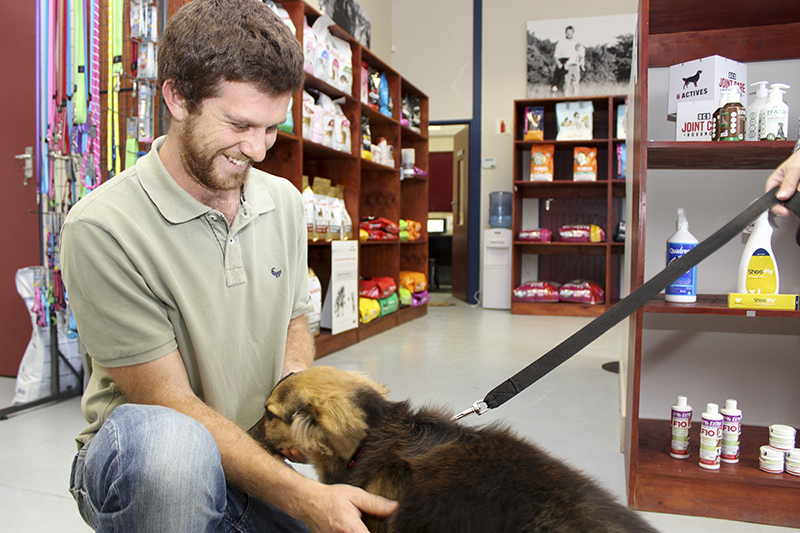A world-class veterinary facility that provides sought-after training for newly qualified professionals from around the world is quietly getting on with ground-breaking work in and around Grahamstown. Sue Maclennan reports
At Ikhala Veterinary Clinic in Grahamstown’s Industrial Area, space-age technology and ground-breaking research into the big game that is the lifeblood of the Eastern Cape’s tourism economy thrive alongside hands-on, face-to-face work with pets and farm animals and their owners.
Co-owner William Fowlds says Peter Brothers created an “incredible” and visionary facility when he established Frontier Vet Clinic five years ago.
“We count ourselves very fortunate to be working in this amazing space,” the well known wildlife vet told Grocott’s Mail during a tour of the facility, which has a full-time staff of five vets, a nurse, and three support staff. Half the staff are from a conservation background. “We didn’t have the luxury of a base before. We did all our work out of vehicles.”
Ikhala Vet clinic opened on 15 January at 3 Strowan Road.
In addition to modern surgical and kennel infrastructure and state of the art x-ray equipment, the clinic houses cutting edge diagnostic laboratory and blood testing machines which can be taken into the field.
Hi-tech on the ground
Compact, portable technology makes it possible for vets to diagnose and treat large game in a single visit. Developed by Nasa for the International Space Station and bought by medical and veterinary diagnostic technology company Abaxis in the 80s, it has revolutionised the way vets work in the field.
“Before, we would have to go out into the field, dart the animal, take samples and send them to Pretoria for analysis. Two days later, on the basis of those results, we’d go back out, dart the rhino again and treat it,” Fowlds said.
“Because the diagnostic unit is compact and portable, vets can it with them into the field and work next to the animal to get instant results. What before might have taken a month can be done instantly.”
On its website Abaxis describes the portable VetScan HM5 as “a fully-automated, five-part differential hematology analyser displaying a comprehensive 22-parameter complete blood count (CBC) with cellular histograms on an easy-to-read touch-screen”.
Also fully portable, the VetScan VS2 is “a state-of-the-art chemistry, electrolyte, immunoassay and blood gas analyzer that delivers uncompromising accuracy from just two drops of whole blood, serum or plasma”. Abaxis boats precision reference laboratory quality results in just 12 minutes.
Troponin – an indicator of damage to the heart in both people and animals – can also be detected with this hi-tech portable equipment.
A portable ultrasound machine makes it possible to diagnose breaks and internal anomalies.
Larger wildlife is still treated in the field, but smaller animals are brought in for observation and treatment.
“Last week we had a blue duiker with a fractured foot and before that we had a sable calf with a heart defect.”
The facility has a separate post-mortem room.
Research
Samples are analysed and stored on site, and extra blood is frozen for research purposes.
“For example, if two years down the line an animal presents with similar anomalies, we can compare blood samples to try and establish possible causes.”
One of the things their research has enabled them to understand is why certain animals don’t thrive in particular areas.
“Sable and roan antelope aren’t endemic to this area, for example,” Fowlds says. “They come from the mineral-rich copper belt, so there are potential nutrition-related problems for them grazing here.
“Using comparative samples, we’re able to understand animals’ needs and nutritional deficiencies better.”
Not only wildlife
While wildlife is a special focus, Ikhala also treats companion animals – cats, dogs and small exotics such as birds and rabbits. Farm animals are a large part of their practice, in particular reproductive work on sheep, cattle, goats and pigs.
Extras include a grooming service at the facility on Saturdays, by appointment.
Collaboration and education
Like other veterinary practices in town, Ikhala works closely with the SPCA.
From 2019 Ikhala will be accommodating up to five Compulsory Community Service (CCS) State Vets, the facility having been formally recognised in February. The compulsory community service year has been in operation by the State since 2016.
They currently provide CCS vet Dr Ashley Lemon with technical support and advice and have in the past allowed her to use their surgery facility for more technical ops. They have recently provided her with essential medications which previously she had no access to.
“We have a solid collaboration with both the SPCA and the State Vet and we’re on standby for them,” Fowlds says.
Like Grahamstown Veterinary Practice in Fitzroy Street, Ikhala writes legal reports for abuse cases and fundraise for welfare work.
One of their biggest collaborative projects is an annual sterilisation campaign with the SPCA and the State Vet, when five vets work together to sterilise 30 dogs in a day.
Because of the variety in its practice, Ikhala is also a sought-after internship. From mid-May to October, veterinary students from all over the world come to Ikhala for practical experience. Their educational contribution has grown over the past decade into a suite of course-based educational experiences for students from universities all over the world and interns who spend 2-3 months at a time being exposed to the diverse range of animal and conservation related activities that happen in the Grahamstown area.
“We draw good students because they learn a lot here,” Fowlds says.
But there’s more to it than that, says Fowlds, who believes strongly in Grahamstown’s potential.
“Something in this area draws people,” Fowlds says. “We’re very optimistic about the strategic importance of Grahamstown in our very bio, agri and socially diverse area.
“We’ve made a significant human resource commitment to the town and we aim to make it work.”


